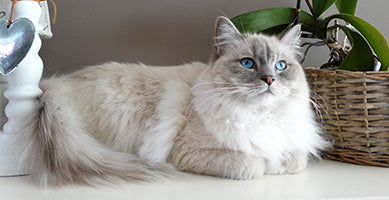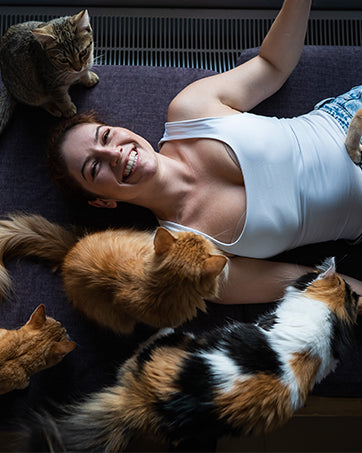Jessica W. Kelvin - Mar.05.2024
Why Do Cats Eat Grass?
7 Insights into Feline Behavior
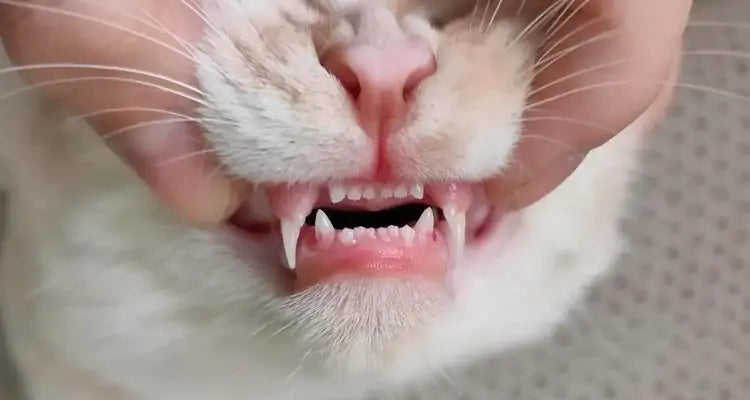
Cat Teeth Cleaning: Do or Don’t?
Est. read time: 9 min.
Ateeth cleaning is one of the easiest ways to help keep your cat healthy—if you go about it the right way. Chances are, when you adopted your kitten, you were told to practice oral hygiene care: teeth brushing, water additives, and dental chews or treats. Who knew that it was recommended to brush a cat's teeth? A daunting-sounding task, to say the least!
For many pet parents, cat teeth cleaning tends to fall into the same category as cat baths: a good idea in theory, but a clawing, hissing disaster in reality. Most cats simply won’t tolerate having their mouth manipulated, let alone their teeth brushed or otherwise inspected at home.
Just because the task of cat teeth cleaning seems nearly impossible doesn’t mean it’s not an important consideration in your cat’s overall health. Keep reading to learn more about the importance of cleaning your cat’s teeth and how to go about getting it done!
Why it’s important to clean your cat’s teeth
Dental health is a huge component in overall general health for humans and animals alike. Various cats (and sometimes specific cat breeds) are more prone to developing periodontal disease like severe gingivitis, the chronic inflammation of the gums that worsens over time. Left untreated, gingivitis can lead to painful dental disease such as tooth resorption, which is a process where the body breaks down tissues surrounding the tooth and absorbs, eventually including the tooth itself. Not taking care of your cat’s teeth can also result in tooth decay, infection, and inflammation in the mouth. All of which can be extremely painful for your cat. The moral of the story is that regular teeth cleaning is necessary. During these cleanings, it may be determined that procedures such as tooth extractions, root canals, or mass removals are recommended.
Signs of feline gum disease
While your veterinarian will assess your cat’s oral health at their annual visit, this isn’t the only time someone should be paying attention to your cat’s oral health. A great time to try to look into your cat’s mouth is while they’re eating: you can usually see their teeth and do not have to make any physical contact. Keep an eye out for the following signs and symptoms of feline gum disease:
- Bad breath
- Angry, red gums (gingivitis)
- Bleeding (from the mouth or nose), sometimes spontaneously
- Drooling
- Difficulty eating
- Eating on one side of the mouth or moving food around in the mouth
- Lack of appetite
- Mild swelling of the face
- Loose or missing teeth
- Looking unkempt or failing to groom
If you have ever had a bad toothache, you know how all-consuming the pain can be. If you notice any of the above signs in your cat, get to your vet immediately. Cat teeth cleaning may need to become a more frequent part of your routine. Or, in more progressive cases, your cat may need some teeth extracted from time to time.
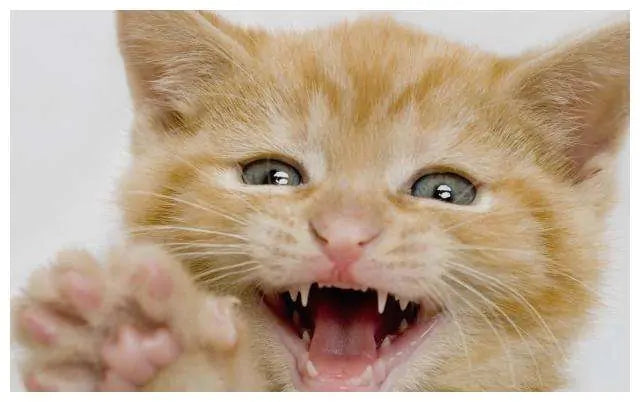
How to maintain oral health at home
It may seem tricky, but daily dental care will help prevent and reduce periodontal disease and other dental-related or health issues your cat might experience. If you have your cat from the kitten stage, you should start daily brushing exercises to acclimate them to the process and get them into a rhythm. If they become used to the act, it makes it much easier to keep up with.
Trying to get an adopted senior or adult cat to enjoy at-home dental cleanings may prove to be more difficult. Often, cats at this stage that are just coming into a home or going to a new home have not experienced getting their teeth brushed. It could take more time and effort to get your cat comfortable with your finger in their mouth, but in some cases, it is possible. Taking it slow and recognizing when enough is enough is very important.
Simpler solutions to practicing good oral hygiene at home include providing your cat with chew toys, a healthy diet of both wet and dry food, water additives, and dental treats. (Wet cat food is more hydrating, while dental treats are better for teeth)
Other dental products that might prove helpful are:
- Water additives: VOHC-approved additives can help reduce tartar build-up.
- Dental chews: While these tend to be more popular for dogs, some cats might enjoy them.
- Dental gel on toys: Again, this is more typical for dogs; but you can try to add a touch of cat-specific dental gel to their favorite toy to chew on.
Please be advised: While helpful, these products aren’t enough by themselves—they’re merely part of a larger care plan and cannot replace brushing and professional vet care.
Cats:Theobromine Toxic Consumption
Most Cats: 1-10 lbs(0.45-4.6 kg), Large Cats11-25 lbs(5-11.4 kg)
Cacao Beans: Most Cats> 0.05 oz, Large Cats> 0.5 0z
Unsweetened Baking Chocolate: Most Cats> 0.2 oz, Large Cats>2 0z
Dark Chocolate: Most Cats> 0.5 0z, Large Cats>7 oz
Milk Chocolate: Most Cats>1.5 0z, Large Cats>16.5 0Z
White Chocolate: Most Cats>360 oz, Large Cats>4000 0z
Cocoa Powder: Most Cats> 01 0z, Large Cats>10z
Cocoa Bean Mulch: Most Cats>0.1 0z, Large Cats>1 0z
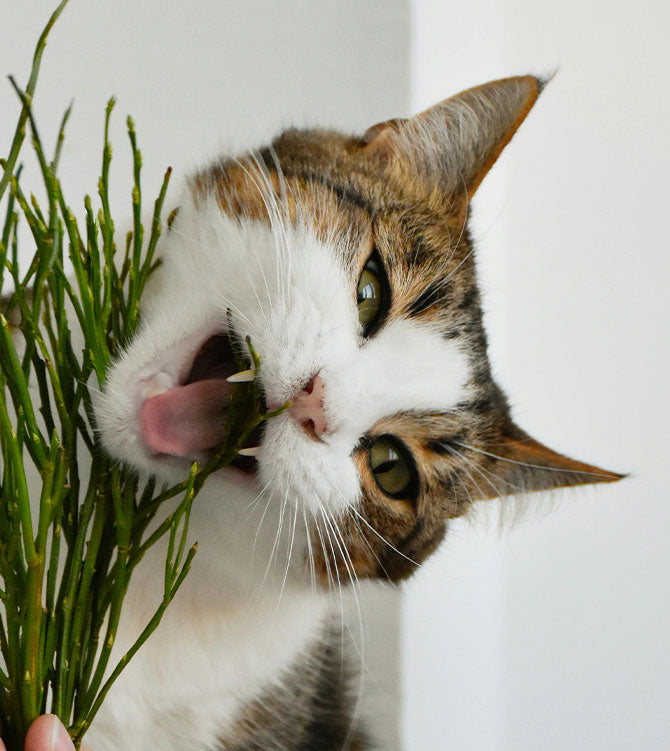
Showing making procedure is a good way to guarantee product quality
Stress Relief
Eating grass can also serve as a form of stress relief for cats, providing a calming activity that distracts from anxiety or boredom.


Get customer attention by clean visual and video
Instinctual Actions
Grass eating is an instinctual behavior that may stem from a cat's need to seek out alternative food sources or to induce vomiting to clear their stomachs of indigestible materials.
Brushing your cat’s teeth
How do you brush your cat's teeth? Here are some tips on brushing your cat’s teeth at home:
Purchase a basic feline oral hygiene kit: this should contain a small cat-specific toothbrush, cat-specific pet toothpaste, some cotton swabs, and possibly some salt and water. WARNING: Never use human toothpaste, as this can pose serious health risks.
First, get your cat used to the idea of having their teeth touched: Use a finger or a cotton swab to gently press on your cat’s teeth and gums to ease into this.
After a few times with only touch, introduce a small amount of cat toothpaste onto your cat’s lips. Now they can begin to adjust to the taste.
Next, incorporate the cat-specific toothbrush. It may even be designed to slip over your finger to facilitate use and help stimulate your cat’s gums. WARNING: Pet parents who opt for a finger brush should be relatively certain their cat won’t bite.
Finally, use a bit of toothpaste with the toothbrush. Give your cat a gentle yet thorough brushing.
Don’t forget to use lots of praise and take breaks if your cat becomes irritated. You don’t want to scar them by using dental hygiene equipment, so follow their lead and allow them to adjust to the action.
Article credit: Heidi Cohen (https://heidicohen.com/use-blog-to-sell/)
Digestive Aid
Grass acts as a natural laxative, helping cats pass hairballs or other indigestible items through their digestive tract more easily.
Elimination of Parasites
It's also theorized that grass eating may help cats eliminate intestinal parasites, although this benefit is more anecdotal than scientifically proven.
Dental cleanings at a veterinarian’s office
What does your veterinarian do in the office that you cannot do at home? In short, they have general anesthesia. Your veterinarian will check your cat’s oral health during annual visits, but they will likely also recommend your cat have a dental cleaning under anesthesia every year, depending on their age and overall health. Vets agree that, for many felines, the only way to pull off a true cat teeth cleaning is with a little help from general anesthesia. This makes the process go much smoother and can allow the vet to get into those hard-to-reach places.
Anesthesia is quite safe for most cats, barring those with certain medical conditions like hyperthyroidism (which your vet will note). Beyond teeth cleanings, your cat will also need to be anesthetized for dental X-rays and, if necessary, polishing and removal of diseased teeth.
Depending on what plan you have, dental cleanings may be covered by your pet’s insurance. While it may cost more to include this service in your plan, your cat’s mouth could be much healthier as a result.
When do cats need professional dental cleanings?
Yearly dental cleanings are for cats what twice-a-year dental cleanings are for humans. Professional cleanings are necessary. During a routine check-up, your cat might show signs of dental decay and gum disease that raise concerns from your vet. The best thing you can do is agree to a professional cleaning to ensure your cat gets the best care.
If there is a chance of an emerging dental issue, your veterinarian will want to act fast to come up with a solution. They may also recommend that your cat seek care with a dental specialist if the suspected dental disease is severe. Otherwise, your vet might recommend cleanings that are more spread out, depending on a few different factors:
-Age
-Lifestyle
-Genetics
-Diet and nutrition
-Other health conditions
If you ever have any concerns about your cat’s dental health, it’s best to reach out to your veterinarian and set up an appointment.
How much does cat dental care cost?
Cat dental care can vary in cost. Depending on the procedure or work that is being done, it can range from $50 to $3,000. The more work that needs to be done, namely more teeth that need to be extracted, the higher the cost of the care.
You can always talk to your vet to get an estimate before going through with the care, or work with them to figure out a payment plan if they offer that. There are also services like CareCredit that are another option to finance veterinary medical bills if your vet’s office does not offer payment plans.
Stay updated on your cat’s health
It is imperative that all aspects of your cat’s life are being taken care of. From eating a healthy diet and exercising daily to having a self-cleaning litter box to keep their space tidy and fresh, your cat deserves the best care possible. Ensuring that your cat has plenty of toys that won’t hurt their teeth can make their dental journey less daunting!
Remember, an ounce of prevention is worth a pound of cure. Don’t wait for something to become more serious than it already is. When it comes to dental health, your cat needs preventative care in order to maintain a healthy mouth. You’ll notice the difference if you start practicing early on your cat; so find a feline toothbrush and a reason to smile brightly!
How to Safely Introduce Grass to Your Cat
Suitable Types of Grass
Certain types of grass are more beneficial and safer for cats, including wheatgrass, which is often sold as "cat grass."
Growing Your Own Cat
Grass
For the safety and health of your cat, consider growing your own cat grass at home. It's a simple and effective way to ensure they're getting a safe product.
Alternative Behaviors and Solutions
Dietary Supplements
If your cat shows an excessive interest in eating grass, it might indicate a dietary deficiency. Consult with a veterinarian about supplementing your cat's diet.
Behavioral Enrichment
Providing toys, climbing structures, and engaging activities can reduce your cat's inclination to eat grass by offering alternative forms of stimulation.
Why Do Cats Eat Grass?
Exploring the curiosity behind this behavior reveals a complex blend of nutritional, psychological, and instinctual factors. Understanding these can help cat owners provide better care and enrichment for their feline friends.
Owner Experiences and Advice
Personal Anecdotes
Many cat owners have observed their pets eating grass and have noted the benefits or concerns that came with it. Sharing these experiences can offer valuable insights for other pet owners.
Expert Recommendations
Veterinarians and animal behaviorists can provide professional advice on managing grass-eating behavior, ensuring it remains a safe and positive experience for your cat.
FAQs
Cats should not eat chocolate ice cream; not only is chocolate toxic to cats, but ice cream often contains toxic ingredient propylene glycol. Ingesting propylene glycol can lead to anemia in cats.
Say it at the end
Understanding why cats eat grass sheds light on their complex behaviors and the natural instincts that drive them. By providing safe, suitable grass and paying attention to the underlying reasons for this behavior, cat owners can ensure their feline companions lead happy, healthy lives.



